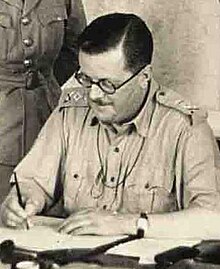Robert Haining
Sir Robert Haining | |
|---|---|
 General Sir Robert Haining | |
| Born | 1882 |
| Died | 1959 (aged 76 or 77) |
| Allegiance | |
| Service/ | |
| Years of service | 1901–1942 |
| Rank | General |
| Unit | Royal Artillery |
| Commands held | British Forces in Palestine and Trans-Jordan Western Command |
| Battles/wars | First World War Second World War |
| Awards | Knight Commander of the Order of the Bath Distinguished Service Order |
General Sir Robert Hadden Haining KCB DSO (1882–1959) was a British Army general who served during the Second World War.
Military career
Robert Haining was commissioned into the Royal Artillery in 1901.[1] He served during the First World War, and after he became a barrister at Lincoln's Inn.[1]
After attending the Staff College, Camberley, he was appointed Assistant Adjutant and Quartermaster General for 2nd Division based at Aldershot in 1928 and then became a General Staff Officer in 4th Division at Colchester in 1930.[1] He served in Military Operations in the War Office from 1931 to 1933 becoming Deputy Director of Military Operations and Intelligence at the War Office in 1933.[1] He became Commandant of the Imperial Defence College in 1935 and Director of Military Operations and Intelligence at the War Office in 1936.[1] He was appointed General Officer Commanding British Forces in Palestine and Trans-Jordan in 1938.[1]
At the outbreak of the Second World War he was appointed General Officer Commanding-in-Chief Western Command and moved on to be Vice Chief of the Imperial General Staff in 1940.[1] He was appointed Intendant General for Middle East Forces in 1941:[1] Prime Minister Winston Churchill described the role of an Intendant General to be that of "serving the Commander-in-Chief with the largest possible measure of supplies".[2] He retired from the British Army in 1942.[1]
He was Colonel Commandant of the Royal Artillery from 1939 to 1950.[1]
Retirement
In retirement he became Lord Lieutenant of Surrey.[3]
References
- Use dmy dates from April 2012
- 1882 births
- 1959 deaths
- Royal Artillery officers
- British Army personnel of World War I
- British Army generals of World War II
- Knights Commander of the Order of the Bath
- Lord-Lieutenants of Surrey
- Companions of the Distinguished Service Order
- British military personnel of the 1936–39 Arab revolt in Palestine
- Graduates of the Staff College, Camberley
- Alumni of the Royal College of Defence Studies
